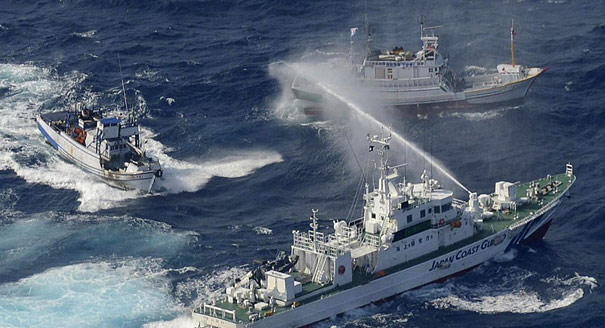Registration
You will receive an email confirming your registration.
IMGXYZ4050IMGZYXOver the past six months, tensions have escalated in the South and East China Seas. Japan and China have grabbed headlines in a spat over China’s claims to the Japanese administered Senkaku/Diaoyu islands, while Taiwan has asserted its own claim in the region and proposed talks to settle the disputes. Yet these are only the latest in a long list of territorial disputes involving many countries and many competing claims. As events progress, what was already a complex and complicated issue over minuscule territories has drawn big power attention.
Three eminent Taiwanese scholars, Han-yi Shaw at the National Chengchi University, Yann-huei Song at Academia Sinica, and Edward I-hsin Chen at Tamkang University, joined Carnegie’s James L. Schoff to discuss maritime disputes in the region and prospects for their peaceful resolution. Peter Dutton, a noted expert on Chinese territorial claims at the U.S. Naval War College, moderated.
Discussion Highlights
- Historical Claims: Shaw challenged both Chinese and Japanese claims to the Senkaku/Diaoyu islands based on history. He argued that both sides have offered inconsistent claims. Thus, Japan and China should resolve the dispute through rational negotiations instead of debating over historical evidence, he asserted. If Taiwan and the PRC argued their case more narrowly in the context of international law, Shaw emphasized the strength of their argument (if properly articulated).
- East China Sea Peace Initiative: According to Song, overlapping claims in recent years have escalated tensions in the Senkaku/Diaoyu area. Multiple actors, including China, Taiwan, Japan, and the United States, have gotten involved, raising the stakes of the situation. In an effort to diffuse hostility, Taiwan’s President Ma Ying-jeou proposed a five-point peace plan, called the East China Sea Peace Initiative (ECSPI). Although obstacles still lie ahead before this plan can be fully implemented, the ECSPI has received increasingly positive regional and international responses and support, Song said. Schoff agreed that the proposal is a good starting place for peaceful resolution.
- Nationalization of the Islands: In the same vein, Japan’s recent nationalization of Senkaku/Diaoyu is also an effort to de-escalate tensions in the region, though China does not hold the same view, Schoff said. At the same time, China’s recent move to send ships back and forth to Senkaku/Diaoyu will only escalate the hostility. Thus, he urged more dialogue to resolve tensions, especially after the Japanese election next year.
- U.S.-Chinese-Taiwanese Leadership Change: Chen outlined how he expects trilateral relations to continue over the coming years:
- United States: Chen argued that despite potential budgetary cuts, the United States can still sustain its Asia “pivot” under the current administration, due to better use of resources from regional allies and partners.
- China: Chen maintained that President Xi Jinping will be a much more powerful leader than his predecessor, Hu Jintao. He should take the U.S. “pivot” into serious consideration, avoiding provocative military strategies and making good use of China’s diplomacy and economic power.
- Taiwan: Chen added that Taiwan’s current administration will have to be flexible and adaptive to the international environment, while still determined to find a resolution and prepared with military strength as a back-up for negotiations.
